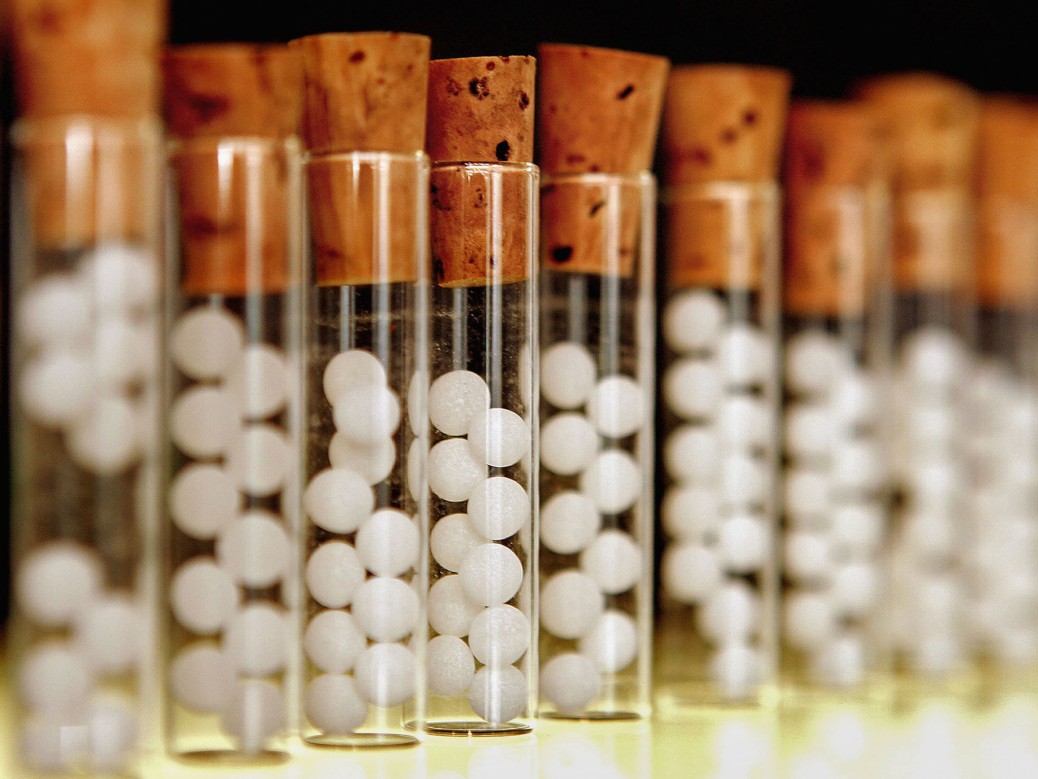Abstract
Autism is a condition characterised by impairments of social communication, social interaction and social imagination. The exact aetiology of autism is unknown but some autistic features have been explained by the ‘opioid excess theory’ in which excess brain peptide levels have a morphine-like activity. Reduction of peptide levels by administration of the duodenum enzyme Secretin has been found to improve social and language skills in autistic patients. Homeopathic Secretin has been said to produce similar effects. A pilot study was undertaken to study these effects by administration of Secretin to a group of autistic patients. Weekly assessment for 12 weeks was performed by the patients’ care workers. Statistical analysis of the mean pre-treatment results compared with the mean treatment results suggested a worsening in the autistic symptoms during treatment. Discussion with the care workers revealed changes and some improvements that were not recordable on the scoring system. Further research into Secretin treatment of autism using a more detailed and customized scoring system would be justified. Following this pilot study a randomised controlled trial of Secretin vs placebo would be appropriate.
Autism spectrum disorder is a condition related to brain development that impacts how a person perceives and socializes with others, causing problems in social interaction and communication. The disorder also includes limited and repetitive patterns of behavior. The term “spectrum” in autism spectrum disorder refers to the wide range of symptoms and severity.
Autism spectrum disorder includes conditions that were previously considered separate – autism, Asperger’s syndrome, childhood disintegrative disorder and an unspecified form of pervasive developmental disorder. Some people still use the term “Asperger’s syndrome,” which is generally thought to be at the mild end of autism spectrum disorder.
Autism spectrum disorder begins in early childhood and eventually causes problems functioning in society – socially, in school and at work, for example. Often children show symptoms of autism within the first year. A small number of children appear to develop normally in the first year, and then go through a period of regression between 18 and 24 months of age when they develop autism symptoms.
While there is no cure for autism spectrum disorder, intensive, early treatment can make a big difference in the lives of many children.
Symptoms
Some children show signs of autism spectrum disorder in early infancy, such as reduced eye contact, lack of response to their name or indifference to caregivers. Other children may develop normally for the first few months or years of life, but then suddenly become withdrawn or aggressive or lose language skills they’ve already acquired. Signs usually are seen by age 2 years.
Each child with autism spectrum disorder is likely to have a unique pattern of behavior and level of severity – from low functioning to high functioning.
Some children with autism spectrum disorder have difficulty learning, and some have signs of lower than normal intelligence. Other children with the disorder have normal to high intelligence – they learn quickly, yet have trouble communicating and applying what they know in everyday life and adjusting to social situations.
Because of the unique mixture of symptoms in each child, severity can sometimes be difficult to determine. It’s generally based on the level of impairments and how they impact the ability to function.
Below are some common signs shown by people who have autism spectrum disorder.
Social communication and interaction
A child or adult with autism spectrum disorder may have problems with social interaction and communication skills, including any of these signs:
- Fails to respond to his or her name or appears not to hear you at times
- Resists cuddling and holding, and seems to prefer playing alone, retreating into his or her own world
- Has poor eye contact and lacks facial expression
- Doesn’t speak or has delayed speech, or loses previous ability to say words or sentences
- Can’t start a conversation or keep one going, or only starts one to make requests or label items
- Speaks with an abnormal tone or rhythm and may use a singsong voice or robot-like speech
- Repeats words or phrases verbatim, but doesn’t understand how to use them
- Doesn’t appear to understand simple questions or directions
- Doesn’t express emotions or feelings and appears unaware of others’ feelings
- Doesn’t point at or bring objects to share interest
- Inappropriately approaches a social interaction by being passive, aggressive or disruptive
- Has difficulty recognizing nonverbal cues, such as interpreting other people’s facial expressions, body postures or tone of voice
Patterns of behavior
A child or adult with autism spectrum disorder may have limited, repetitive patterns of behavior, interests or activities, including any of these signs:
- Performs repetitive movements, such as rocking, spinning or hand flapping
- Performs activities that could cause self-harm, such as biting or head-banging
- Develops specific routines or rituals and becomes disturbed at the slightest change
- Has problems with coordination or has odd movement patterns, such as clumsiness or walking on toes, and has odd, stiff or exaggerated body language
- Is fascinated by details of an object, such as the spinning wheels of a toy car, but doesn’t understand the overall purpose or function of the object
- Is unusually sensitive to light, sound or touch, yet may be indifferent to pain or temperature
- Doesn’t engage in imitative or make-believe play
- Fixates on an object or activity with abnormal intensity or focus
- Has specific food preferences, such as eating only a few foods, or refusing foods with a certain texture
As they mature, some children with autism spectrum disorder become more engaged with others and show fewer disturbances in behavior. Some, usually those with the least severe problems, eventually may lead normal or near-normal lives. Others, however, continue to have difficulty with language or social skills, and the teen years can bring worse behavioral and emotional problems.
Causes
Autism spectrum disorder has no single known cause. Given the complexity of the disorder, and the fact that symptoms and severity vary, there are probably many causes. Both genetics and environment may play a role.
- Genetics. Several different genes appear to be involved in autism spectrum disorder. For some children, autism spectrum disorder can be associated with a genetic disorder, such as Rett syndrome or fragile X syndrome. For other children, genetic changes (mutations) may increase the risk of autism spectrum disorder. Still other genes may affect brain development or the way that brain cells communicate, or they may determine the severity of symptoms. Some genetic mutations seem to be inherited, while others occur spontaneously.
- Environmental factors. Researchers are currently exploring whether factors such as viral infections, medications or complications during pregnancy, or air pollutants play a role in triggering autism spectrum disorder.
Risk factors
The number of children diagnosed with autism spectrum disorder is rising. It’s not clear whether this is due to better detection and reporting or a real increase in the number of cases, or both. Autism spectrum disorder affects children of all races and nationalities, but certain factors increase a child’s risk. These may include:
Your child’s sex. Boys are about four times more likely to develop autism spectrum disorder than girls are.
- Family history. Families who have one child with autism spectrum disorder have an increased risk of having another child with the disorder. It’s also not uncommon for parents or relatives of a child with autism spectrum disorder to have minor problems with social or communication skills themselves or to engage in certain behaviors typical of the disorder.
- Other disorders. Children with certain medical conditions have a higher than normal risk of autism spectrum disorder or autism-like symptoms. Examples include fragile X syndrome, an inherited disorder that causes intellectual problems; tuberous sclerosis, a condition in which benign tumors develop in the brain; and Rett syndrome, a genetic condition occurring almost exclusively in girls, which causes slowing of head growth, intellectual disability and loss of purposeful hand use.
- Extremely preterm babies. Babies born before 26 weeks of gestation may have a greater risk of autism spectrum disorder.
- Parents’ ages. There may be a connection between children born to older parents and autism spectrum disorder, but more research is necessary to establish this link.
Complications
Problems with social interactions, communication and behavior can lead to:
- Problems in school and with successful learning
- Employment problems
- Inability to live independently
- Social isolation
- Stress within the family
- Victimization and being bullied
Prevention
There’s no way to prevent autism spectrum disorder, but there are treatment options. Early diagnosis and intervention is most helpful and can improve behavior, skills and language development. However, intervention is helpful at any age. Though children usually don’t outgrow autism spectrum disorder symptoms, they may learn to function well.
Homoeopathic Treatment
1. Aethusa cynapium:
- The characteristic symptoms relate mainly to the brain and nervous system, connected with gastro-intestinal disturbance.
- Restless; anxious; disconnected; uneasy and violent;
- Inability to think, to fix the attention.
- Anguish, crying, and expression of uneasiness and discontent, lead to this remedy most frequently in disease in children
2. Agaricus Muscarius:
- Singing, shouting, muttering rhymes and prophecies.
- Loquacious, talk unintelligent, continuously changes topics.
- Twitching in muscles is a marked symptom.
- Aversion to work. Does not want to do his daily household work.
- Talks continuously and jumps over one to another topic. Sings, talk but does not answer;
- Indifference;
- Great mental excitement and incoherent talking;
- Mental confusion. Agaricus acts as an intoxicant to the brain, producing more vertigo and delirium than alcohol, followed by profound sopor with decreased reflexes.
3. Baryta carb:
- Weak memory, idiotic child.
- Shyness with low confidence.
- Aversion to strangers, hides himself behind a chair.
- Physically dwarf stunted growth.
- Tendency of recurrent tonsillitis.
- Very sensitive to cold air, cold weather.
- Excellent homeopathy remedy for children with autism who have low IQ.
- Loss of memory; mental weakness.
- Lost confidence in himself; bashful; aversion to strangers.
- Childish; grief over trifles; irresolute; do not grow and develop.
- They are backward physically and mentally.
- Very averse to meeting strangers; children subject to quincy
4. Carcinosin:
- Wonderful homeopathic medicine for autism spectrum disorder.
- Child is mild, yielding and sensitive to reprimands.
- Hyperactivity is not very marked in Carcinosin patients.
- May have interest in art work like drawing, singing, colouring etc.
- Affectionate and sympathetic patient.
- Autism in children with family history of cancer or strong history of diabetes and coronary artery disease in both paternal and maternal families.
- Child if often slow but agreeable and caring.
5. Calcarea phos:
- Anemic children who are peevish and irritable.
- Strong desire to go out.
- Traveling, motion desires.
- Recurrent tonsillitis or adenoiditis. Pain on opening of mouth.
- Mouth breathing
- Infants want to nurse all the time and vomit easily.
- Craving for salted smoked meat.
6. Hyoscyamus:
- Low muttering speech.
- Very suspicious.
- Talkative; obscene; jealous; foolish.
- Great hilarity; inclined to laugh at everything; deep stupor.
- Quarrelsome; uncovers body; purposeless movements; no love for nearly once.
7. Kali brom:
- Homeopathic medicine for autism where child moves purposelessly;
- Hand flapping, fidgety hands.
- Loss of memory; can pronounce any word told, but cannot speak otherwise;
- Night delusions; horrid illusions.
8. Lycopodium:
- Anxious child, specially appears in public.
- Obstinate, domineering, does not share things.
- Anticipatory anxiety
- Desire for sweet and warm food. Intolerance for cold drinks.
- Weak, emaciated, precocious children.
- Anger, violent, irritable child.
- Aversion to company, but needs someone in house.
9. Phosphorus:
- Very affectionate, friendly child.
- Yielding, mild, cheerful patient.
- Desire for cold drinks, ice-cream and fruit juices.
- Constipation, hard stool.
- Restless, fearful, fear of loud noises and external impressions.
- fear when alone, fear of thunderstorms.
10. Silicea:
- Obstinate child, concern about everything.
- Homeopathic medicine for autism in children who are intelligent (good in academics), sensitive to reprimands, obedient.
- Fixed ideas for everything.
- Profuse sweating in palm and soles.
- Very obstinate constipation.
- Defective nutrition, can not assimilate what he eats.
- Very sensitive to cold weather.
- Autism after vaccination.
11. Tarantula:
- Hyperactive child; extreme restless;
- Must keep in constant motion;
- Sudden mood changes.
- Aversion to company; disconnected.
- Homeopathic medicine for autism spectrum disorder in which has destructive behavior
- Likes bright colors.
- Like music and dance.
12. Helleborus:
- Useful for autistic children who have reduced sensitivity to pain and temperature stimuli.











